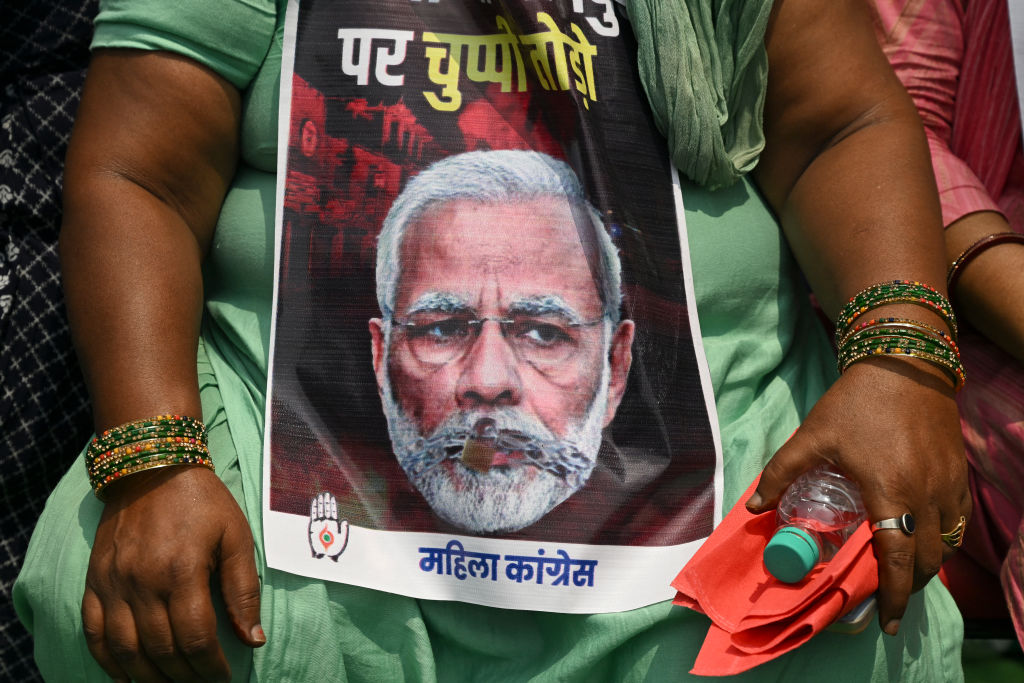
Indian Prime Minister Narendra Modi will face a vote of no-confidence in parliament after a lawmaker from Congress, India’s main opposition party, introduced a motion over the ongoing violence in the northeastern state of Manipur. Om Birla, the speaker of the Lok Sabha, or lower house of parliament, approved the motion on Wednesday, saying he would soon decide when the debate and vote would take place.
Modi’s ruling Bharatiya Janata Party (BJP) and its Hindu nationalist allies have an overwhelming majority in parliament, all but guaranteeing his political survival. But opposition leaders hope the move will force the Indian leader to speak at length about ethnic clashes in Manipur, which have led to the deaths of more than 130 people and the displacement of tens of thousands more.
"We are well aware that the numbers are not in our favor," opposition MP Manoj K Jha said on Wednesday. "But it is not about the numbers, the PM will have to speak in parliament following a no-confidence motion."
The Indian government has largely remained silent about the crisis that began in Manipur in early May between the majority Meitei group, who are overwhelmingly Hindus, and the mainly Christian Kuki and Naga tribes in the BJP-led state. But last week, videos showing two Kuki women being paraded through a village after being stripped naked and assaulted by a mob in Manipur went viral, sparking national outrage and global condemnation, including from a senior Biden official, who said the U.S. was “shocked and horrified” by the video.
More From TIME
The reaction compelled Modi to break his silence on the conflict in front of reporters before a parliamentary session. “The guilty will not be spared. What has happened to the daughters of Manipur can never be forgiven,” he said. Home Minister Amit Shah followed, stating that the government was “ready to discuss” the situation in Manipur “for as many hours as required,” adding that “the government has nothing to hide about Manipur.”
Read More: The Indian State of Manipur Is on the Verge of Civil War. Modi Hasn't Said a Word About It
Modi will now have to give a detailed statement in response to the motion in the monsoon session of parliament, held from July 20 until Aug. 11. The motion will be followed by a debate before it is put to vote, expected within the next 10 days.
Arati Jerath, a prominent Indian political commentator, tells TIME that the government “may evade” the motion by “engineering enough ruckus to force an early end to the monsoon session.”
The BJP plans to fast-track legislative action on as many as 21 new bills during the monsoon session, but the opposition’s insistence on having a response from Modi could see the two parties engage in a standoff.
“The government is on the defensive about Manipur. Although that would mean defying parliamentary rules and conventions, it wouldn’t be the first time the government would have tweaked the rule book,” Jerath adds.
The no-confidence motion signals a broader attempt by opposition parties to ramp up pressure on Modi ahead of general elections in May 2024.
Last week, 26 opposition parties announced the Indian National Developmental Inclusive Alliance, or INDIA, saying that the future of the country’s multiparty democracy and secular foundations are at risk under Modi. In response, the BJP called the new alliance a group of “self-serving, corrupt, dynastic parties.”
This is the second time Modi faces a no-confidence motion since coming to power in 2014. In 2018, a Congress lawmaker brought a motion that was defeated after a 12-hour debate over the state of Andhra Pradesh, which was controversially split into two by Modi's government and given a special category status for tax concessions to attract new investors.
More Must-Reads from TIME
- How Donald Trump Won
- The Best Inventions of 2024
- Why Sleep Is the Key to Living Longer
- Robert Zemeckis Just Wants to Move You
- How to Break 8 Toxic Communication Habits
- Nicola Coughlan Bet on Herself—And Won
- Why Vinegar Is So Good for You
- Meet TIME's Newest Class of Next Generation Leaders
Write to Astha Rajvanshi at astha.rajvanshi@time.com